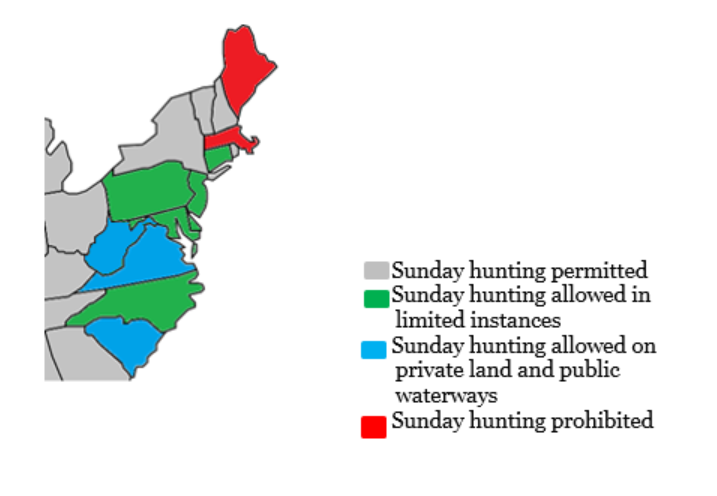Bans on Sunday hunting in some states originated as puritanical laws established in colonial America and into the 1800s to prevent trade and other activities that conflicted with observance of a “day of rest.” When those restrictions were put in place, the other activities prohibited included opening a store for business, drinking alcoholic beverages and tilling fields. Merchants challenged those laws at the end of the 19th century and the restrictions began to be repealed.
Other outdoor activities are allowed on Sunday, including those that take place on public and private property such as fishing, hiking and golf. With the removal of most restrictions on Sunday activities, the continuation of bans on Sunday hunting effectively and tacitly endorse an anti-hunting view. Such a view ignores the fact that hunting is part of America’s heritage and hunters contribute billions of dollars to wildlife and conservation programs.
Eleven states either restrict or ban hunting on Sunday. Those restrictions both reduce recreational activities and harm local economies. One analysis shows that the removal of bans on Sunday hunting in six states could result in more than 27,000 new jobs being created, paying more than $731 million in wages and contributing about $2.2 billion in additional economic activity.
Sunday hunting is seen as a key component of providing more people, especially youth, with more opportunities to engage in the sport, which ultimately leads to more hunters in the years to come. Maintaining America’s large number of hunters is crucial to maintaining the revenues necessary to sustain crucial wildlife and wildlife habitat conservation programs. Anti-hunting groups support Sunday hunting bans as part of their general opposition to hunting.
Current Sunday Hunting Restrictions and Recent Activity
Connecticut, Delaware, North Carolina, West Virginia and Virginia are the latest states to expand Sunday hunting opportunities. In 2014, Virginia hunters participated in a successful, first season of Sunday hunting on private lands and public waterways. Virginia allows for hunting on Sundays with some exceptions mostly relating to the proximity of a place of worship.
In 2015, both Connecticut and North Carolina passed legislation that lessened restrictions on their Sunday hunting laws. In 2017, North Carolina further expanded Sunday hunting opportunities by allowing hunting on public land managed by the Wildlife Resources Commission and directed the WRC to conduct a statewide study of attitudes about hunting migratory birds on Sundays, including its social and economic impacts.
Also in 2017, West Virginia legalized Sunday hunting statewide on private lands with the written permission of the landowner. In 2018, Connecticut and West Virginia expanded their Sunday hunting opportunities. Connecticut enacted legislation that allows hunting on all private lands and West Virginia allows hunting on Sunday on private and public lands.
Sunday Hunting Prohibited
- Two states prohibit hunting on Sunday for any wild game – Maine and Massachusetts.
Limited Sunday Hunting
- Maryland allows hunting on Sundays in some counties on private land.
- West Virginia allows hunting on Sunday on private and public land.
- South Carolina and Virginia allow Sunday hunting on private land and some public waterways for waterfowl.
- North Carolina allows Sunday hunting on private and public lands managed by the State for hunting.
- New Jersey allows bowhunting on Sundays for deer on state wildlife management areas and private property.
- Pennsylvania allows hunting on Sundays for foxes, crows and coyotes.
- Connecticut allows deer hunting on Sunday with a bow and arrow on private property.
- Delaware hunters can hunt on private or public land on five individual Sundays that occur between the opening and closing dates of the October muzzleloader deer season, between the opening and closing dates in November, December and January shotgun deer seasons and the Sunday at the end of the November shotgun deer season.


